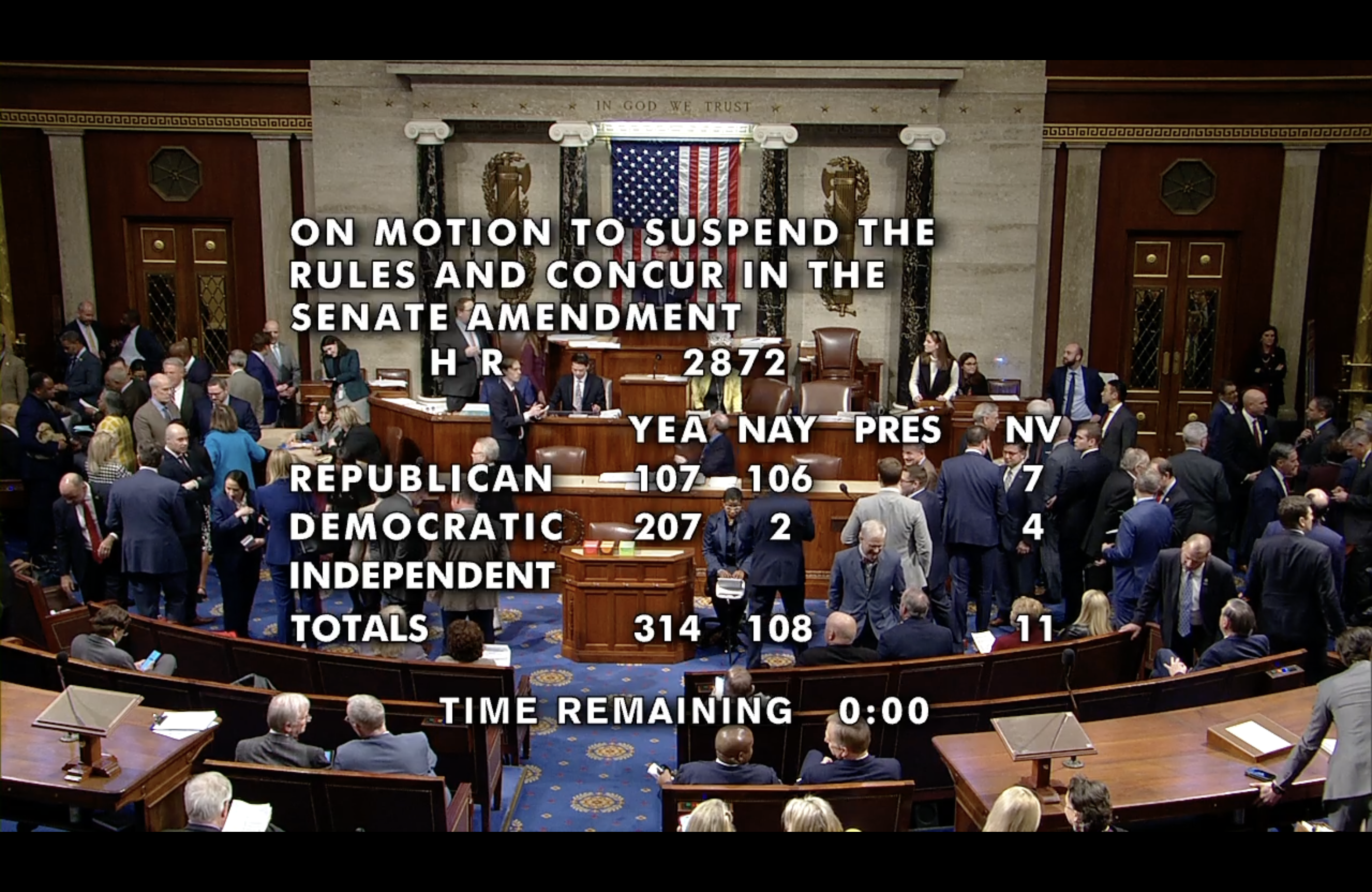A partial federal government shutdown has been once again been averted thanks to the eleventh hour passage of a bill in Congress to keep public agencies and the United States military humming for another few weeks.
H.R. 2872 today received affirmative bipartisan votes in both chambers, setting the stage for President Joe Biden to sign it into law tomorrow. The legislation pushes the threat of a shutdown out at least several more weeks (to early March), just as bills passed in September and November of last year did. And, as before, the legislation passed over the angry objections of the House Republicans’ Fascist Faction, who have been trying to force a government shutdown for months.
In the Senate, the vote to pass H.R. 2872 was 77–11. In the House, it was 314 to 108. Almost all opposition came from Republicans. Two Democrats in the House, upset about the lack of action on aid for Ukraine, voted nay.
Originally, H.R. 2872 was a bill “to amend the Permanent Electronic Duck Stamp Act of 2013 to allow the Secretary of the Interior to issue electronic stamps under such Act, and for other purposes.” It was repurposed to serve as a vehicle for the continuing resolution and has been rechristened the Further Additional Continuing Appropriations and Other Extensions Act, 2024 following the Senate’s adoption of a substitute proposed by our very own Senator Patty Murray.
According to a press release from the Senate Committee on Appropriations (which Murray chairs), the continuing resolution extends funding through the following dates for the following federal departments and purposes:
- March 1st, 2024 for four appropriations bills: Agriculture, Rural Development, Food and Drug Administration, and Related Agencies; Energy and Water Development; Military Construction, Veterans Affairs, and Related Agencies; and Transportation, Housing and Urban Development, and Related Agencies.
- March 8th, 2024 for the remaining eight appropriations bills: Commerce, Justice, Science, and Related Agencies; Defense; Financial Services and General Government; Homeland Security; Interior, Environment, and Related Agencies; Labor, Health and Human Services, Education, and Related Agencies; Legislative Branch; and State, Foreign Operations, and Related Programs.
A section-by-section of the continuing resolution is available at this link.
The full legislative text is also available.
The roll call in the Senate was as follows:
Voting yea to keep the federal government open: Democratic Senators Patty Murray and Maria Cantwell (WA), Jeff Merkley and Ron Wyden (OR), Jon Tester (MT); Republican Senators Lisa Murkowski and Dan Sullivan (AK), Steve Daines (MT)
Voting nay to partially shut down the federal government: Republican Senators Mike Crapo and Jim Risch (ID)
The roll call in the House was as follows:
Voting yea to keep the federal government open: Democratic Representatives Suzan DelBene, Rick Larsen, Marie Gluesenkamp Perez, Derek Kilmer, Pramila Jayapal, Kim Schrier, Adam Smith, and Marilyn Strickland (WA), Suzanne Bonamici, Earl Blumenauer, Val Hoyle, and Andrea Salinas (OR), Mary Peltola (AK); Republican Representatives Dan Newhouse and Cathy McMorris Rodgers (WA), Cliff Bentz and Lori Chavez-DeRemer (OR), Mike Simpson (ID), Ryan Zinke (MT)
Voting nay to partially shut down the federal government: Republican Representative Matt Rosendale (MT)
Not voting: Republican Representative Russ Fulcher (ID)
“I have been working nonstop with my colleagues in both chambers to keep this process moving as quickly as we possibly can so that we can write and pass the strongest possible funding bills,” Senator Murray said on the Senate floor in remarks urging a yes vote. “Passing this measure will allow us the time we need to hammer out those funding bills for Fiscal Year ‘24 — after many months of needless delays. I think we all want this to be a drama-free and reliable process. So I hope that House Republicans will work with us to make that possible now too — which means leaving extreme partisan demands at the door.”
And enough of them did, allowing H.R. 2872 to clear the legislative branch before lawmakers headed to the airport to return home to their districts.
“Today, with yet another upcoming government funding deadline, I voted to protect Southwest Washington families and our economy from a destructive government shutdown,” said Representative Marie Gluesenkamp Perez in a statement sent to the Northwest Progressive Institute.
“Nevertheless, repeatedly funding our government with temporary stopgap measures shouldn’t become the new normal. It’s why I introduced bipartisan legislation to revamp our annual budget process and finally address our growing deficit for the sake of American taxpayers.”
“It’s my hope that Congress will continue working to reach bipartisan agreement on full-year funding bills, as well as much-needed support to secure our Southern Border and assistance for our allies Ukraine and Israel to defend their democracies. I remain eager to work with my Republican and Democratic colleagues on funding bills that prioritize the needs of Southwest Washington.”
If the past is any indication, though, we’ll see another stopgap funding bill in March that will push the threat of a partial shutdown out to May or June.

